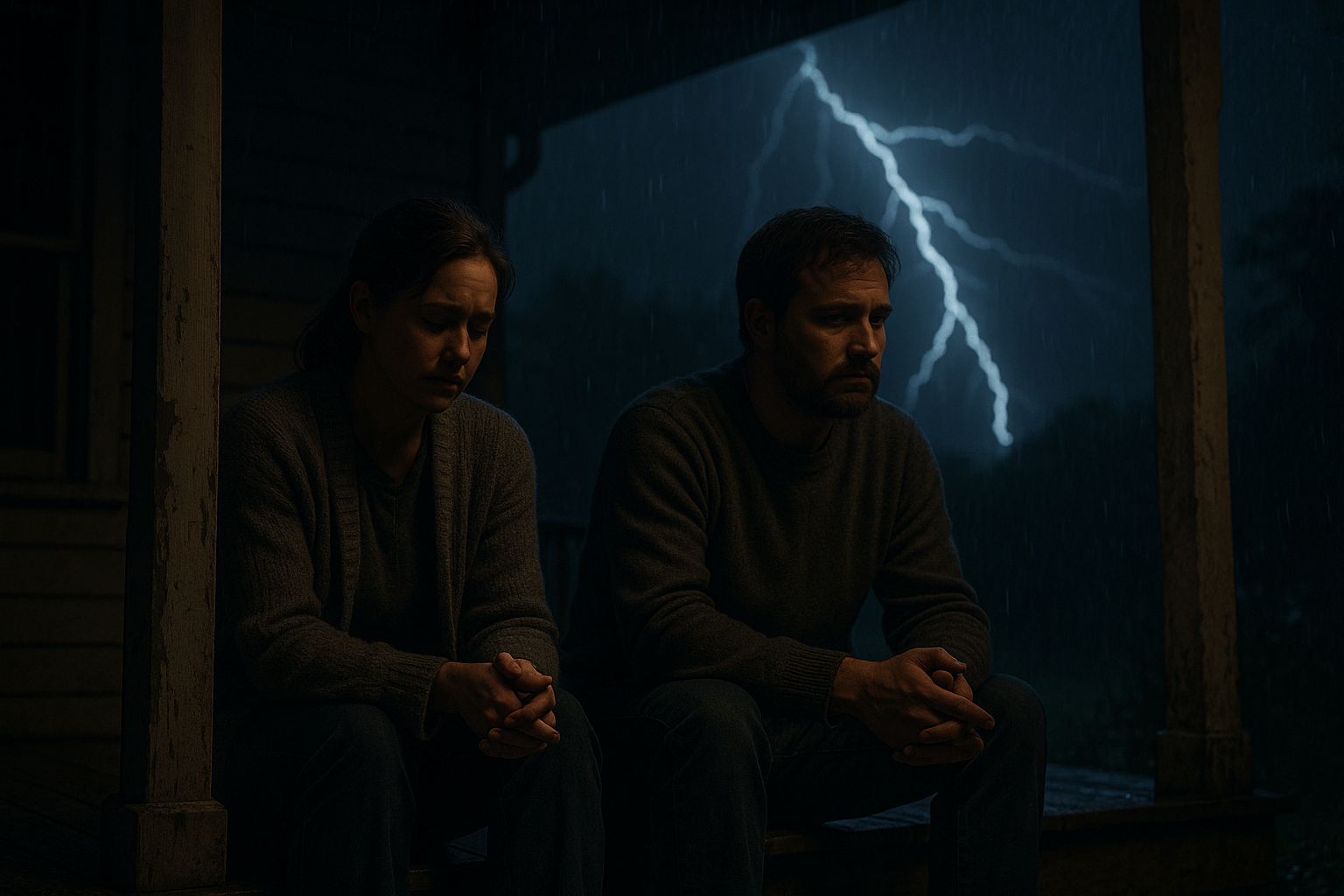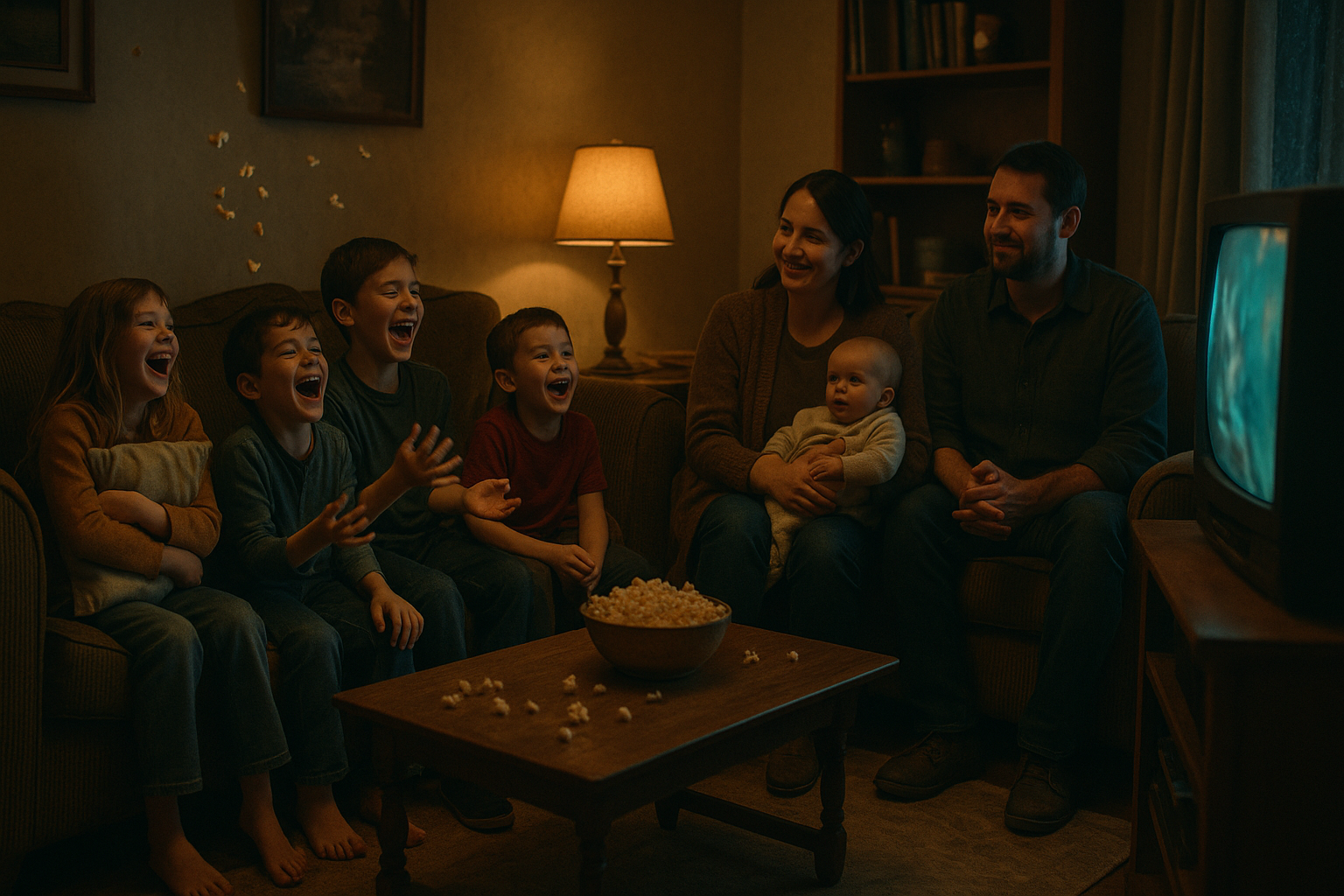It was the kind of rain that made the world feel heavy.
Thick gray clouds blanketed the sky, casting the neighborhood in shadow. Puddles gathered like secrets at every street corner. Inside a dimly lit kitchen, Ethan sat with a chipped mug of coffee in hand. He wasn’t drinking it so much as holding it for warmth. For something to do.

Across from him, Lily—his six-year-old daughter—was humming as she colored a page filled with bright suns and flowers. The crayons rolled across the table every time she reached for a new shade. In a world that felt drowned in grief, Lily painted her own little spring.
Ethan watched her, feeling the familiar tug in his chest.
His wife, Amanda, had died two years earlier after a brutal fight with cancer. She had always been the glue, the laughter, the hum in the walls. Since then, the house had grown quiet. Not the peaceful kind of quiet—but the aching kind. The kind that settled into the floorboards and whispered through the hallways.
Some days, Ethan wondered if a man could completely fall apart… and never make a sound doing it.
And then came the knock.
He opened the front door to a storm—and a woman who looked like she’d come straight out of it.
Soaked to the bone, her hair clung to her face in dripping strands. In one arm, she cradled a sleeping baby. With the other, she held the hands of two small boys. Their clothes were wet. Their shoes squelched on the porch. But what struck Ethan most were their eyes—too quiet, too old for boys their age.

“I’m sorry,” the woman said, her voice barely rising above the rain. “I know this is strange. But we… we don’t have anywhere else to go.”
Ethan stared at her, stunned.
Grace, she said her name was.
The boys were Daniel, nine, and Ben, seven. The baby—Noah—was barely a year old. Her husband had died months ago. A car crash. No insurance. No savings. They’d bounced from couch to shelter to nowhere.
Ethan didn’t ask questions. He didn’t ask how she knew where he lived, or why she’d come. Sometimes, you don’t need answers to recognize a kind of desperation that mirrors your own.
He looked at Grace.
At her children.
Then back at the quiet house he and Lily had lived in—just the two of them—for far too long.
And he stepped aside.
“Come in.”
A home built for two made space for six.

The first few days were chaos.
Noah cried at night. The boys bickered. Toys were everywhere. Grace apologized constantly—for the noise, the mess, the intrusion. She tried to clean as much as possible, often late into the night, and once Ethan caught her scrubbing the baseboards at 1 a.m.
“I just want to help,” she whispered when he asked.
He nodded. But deep down, he wasn’t sure what he’d done.
Some nights, he lay awake wondering if he had tried to rescue someone else’s sinking boat without realizing his own had never truly stopped leaking.
One evening, Lily came running to him in tears because the boys were fighting over a blanket. “They said it’s theirs,” she sobbed. “But it was from Mommy’s room.”
Ethan’s heart clenched. His first instinct was to tell Grace it wasn’t working. That they needed space. That maybe this was a mistake.
But before he could say a word, Grace was already kneeling with the kids. Her voice was gentle, but unwavering.
“This is hard,” she said. “We’re all grieving. But we can’t hurt each other to heal ourselves. Let’s try to be kind. Even when it’s not easy.”
She looked at Ethan after. Not with apology. But with quiet strength.
And something inside him shifted.
It wasn’t a dramatic change. More like a slow thaw.
He saw her one day behind the laundry line, her back turned, shoulders shaking. She thought no one was watching. She pressed a hand to her mouth to muffle the sobs.
She was grieving too. Not loudly. Not publicly. But deeply.
That night, when the kids were asleep, Ethan joined her on the porch. The sky was ink-black, occasionally lit by flashes of lightning.
They didn’t talk at first.
Then Grace said, “He died working a double shift. We needed the overtime. I told him to rest. He said he’d sleep after dinner.”
Ethan looked at her.
“My wife died angry,” he said. “Not at me. At life. At the cancer. At the way I kept trying to fix things I couldn’t fix.”
They sat together in silence. No tears. No dramatic confessions. Just two people holding their pain side by side.
And from that moment on, something invisible began to grow between them.
The children softened.
Lily started drawing with Ben. Daniel helped Ethan fix the leaky tap. Noah followed Grace around like a shadow, but occasionally reached for Ethan’s hand too.

One rainy afternoon, all the kids crammed into the living room to watch an old VHS tape of The Iron Giant. They screamed with laughter, throwing popcorn in the air. Ethan caught himself laughing too. Loudly. Freely. For the first time in what felt like years.
Later that night, Grace sat with him on the couch after the kids had fallen asleep mid-cuddle.
She smiled at the quiet.
“This feels like life again.”
Ethan didn’t reply.
Some truths are too fragile to speak aloud.
The season changed.
The rain lifted. Sunlight filtered into rooms that had forgotten how to glow.
Grace got a job teaching music at a nearby community center. Ethan picked up extra shifts at the warehouse. The kids enrolled in school and came home chattering about teachers and friends and lunchroom drama.
On Sundays, they walked to the farmer’s market together—a ragtag group with mismatched coats and wild laughter. The vendors began recognizing them.
“They’re like a family,” someone said.
Some whispered, “Is she his girlfriend?”
One afternoon, a neighbor asked outright: “Are you two… you know… together?”
Ethan just glanced at Grace.
She didn’t look away.
Her eyes didn’t hold romance. Not yet. But they held trust. Respect. Resilience. The kind of bond forged by weathering storms, not whispering promises.
He smiled faintly. “We’re figuring things out.”
And that was enough.

That evening, the roof leaked. The rice burned on the stove. Ben had a tantrum and Noah spilled juice on the couch. Daniel forgot his homework. Everyone talked over each other. The house was too loud, too messy.
But it was full.
As they tucked the kids into blankets on the floor, Grace looked around and then met Ethan’s eyes.
“You saved us.”
He shook his head. “No. You brought us back to life.”
And in the quiet hum that followed—crickets outside, the soft breathing of sleeping children—neither of them said another word.
Because some kinds of love don’t need names.
They’re not loud. They don’t burn like fire.
But they hold like roots.
They shelter.
They grow.
And sometimes, they begin with nothing more than a knock on the door… and the courage to open it.


